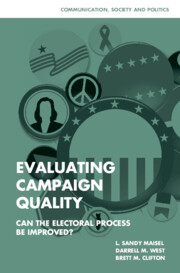5 - Impact on Public Responses
Published online by Cambridge University Press: 03 December 2009
Summary
Voters play a crucial role in campaign reform. They are the objects of persuasion and mobilization, and the people who are on the receiving end of political advertisements, news coverage, debates, mailings, phone calls, Web sites, and speeches. Efforts to make the electoral system work better center on how citizens feel about the political process. Without some positive impact on the general public, campaign reform cannot be judged effective. It is not enough for consultants, candidates, and reporters to view proposed remedies as an improvement. Rather, citizens must see a difference in how elections function.
These objectives are difficult to achieve because there long has been a culture of cynicism and dissatisfaction in the United States. Citizens do not trust the government in Washington to do what is right. Following Watergate, Vietnam, economic stagflation, Iran-Contra, the House bank scandal, and Monica Lewinsky, voters believe that politicians are out for themselves and are not likely to represent the public interest.
This chapter looks at how voters have responded to campaign reform proposals and whether changes are associated with making citizens feel better about the system. Using the results of our national public opinion survey, we examine voter opinions about campaign reform and the election. If there were debates, forums, and candidate pledges to avoid negative campaigning in the person's local congressional district, was there any association with citizen impressions of campaign tone, issue discussion, and knowledge of the candidates?
- Type
- Chapter
- Information
- Evaluating Campaign QualityCan the Electoral Process be Improved?, pp. 79 - 93Publisher: Cambridge University PressPrint publication year: 2007

